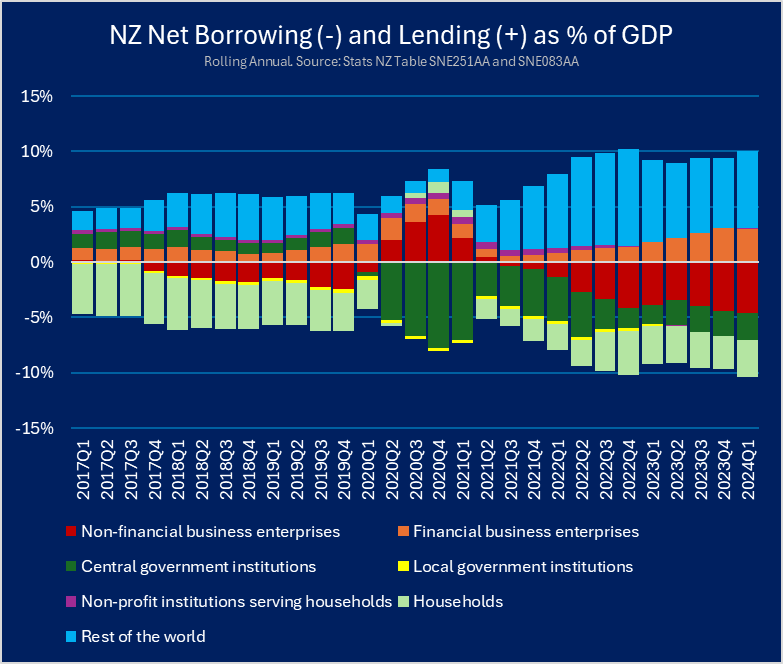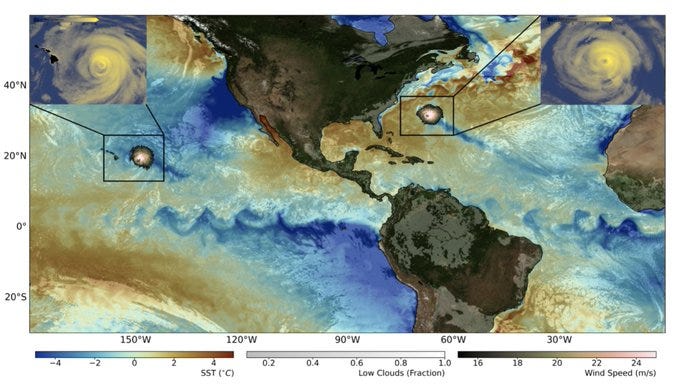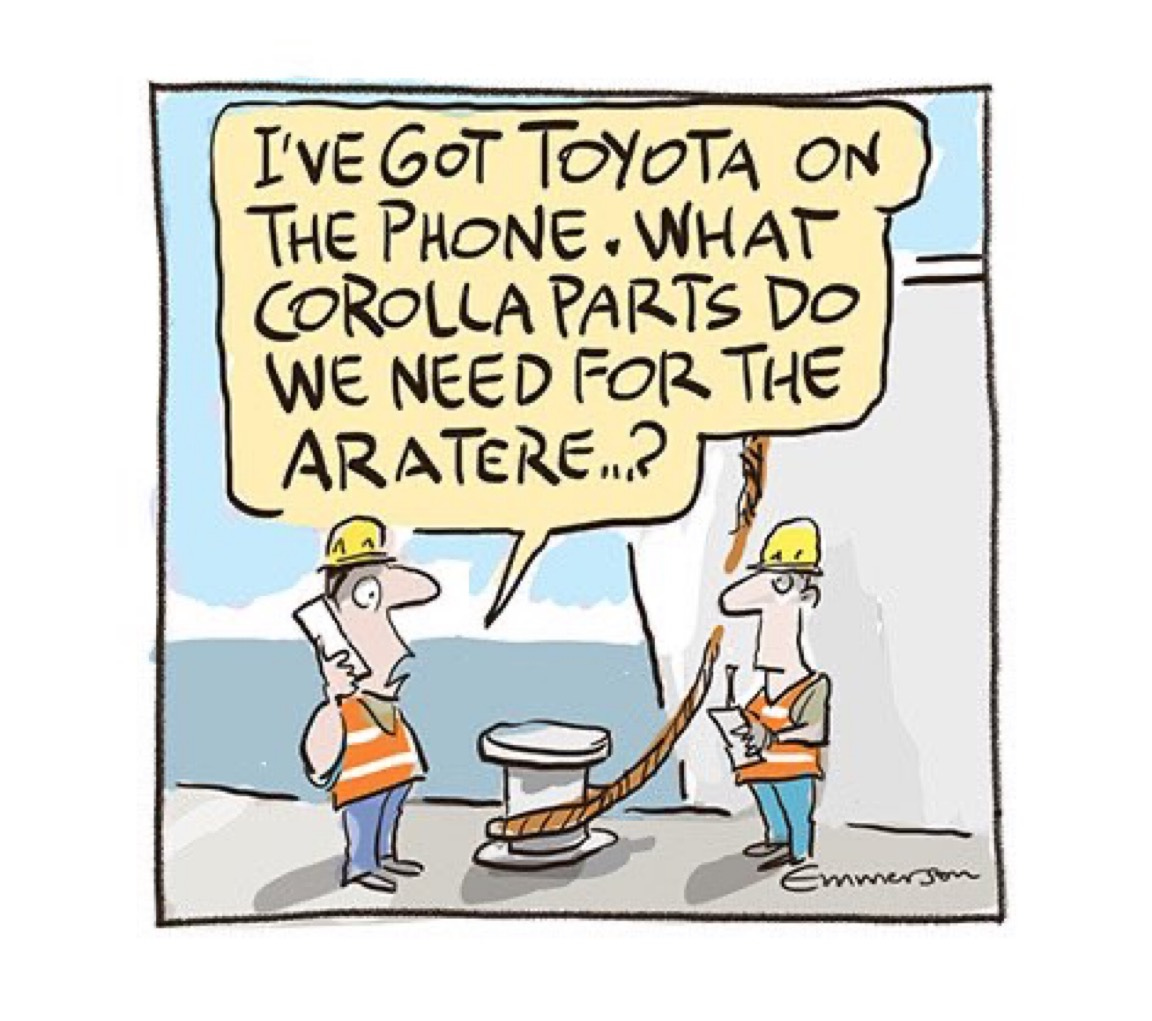TL;DR: My top six things to note around housing, climate and poverty in Aotearoa’s political economy on Monday, August 12:
1. Thinking differently about what matters
I attended a two-day seminar in Auckland over the weekend called Economics for Sustainable Prosperity that was run by Steven Hail, a professor at Torrens University in Australia, in which he talked about Modern Monetary Theory (MMT) and Ecological Economics. I found it enlightening and thought-provoking. Regular readers may recall this introductory interview I had with him a few weeks ago.
I’ll be delving more into the ideas and evidence around MMT, Doughnut Economics, Degrowth in the weeks and months to come in my reporting, interviews and analysis. While he was here, Steven was interviewed by Jack Tame on 1News’ Q+A programme. To get a flavour, here’s the full interview and this brief report from 1News.
In essence, MMT argues that the most important thing a Government should focus on is the best use of all the resources available to achieve what society wants in a sustainable way, rather than targeting balanced Budgets and low public debt for the sake of it. It argues the Government is not constrained by deficits and debt, but by the need to avoid over-using resources to stretch an economy into inflation or the planet into exctinction. There’s a lot more, but I’ll go into it in a series of deep dive pieces in the weeks and months to come.
2. So where did those 1,000 children go?
Associate Housing Minister Tama Potaka announced yesterday that the Government has already reduced the number of households living in motels by 32% to 2,133, including moving 540 families who had been in motels for more than 12 weeks to the top of the social housing register. He said that meant 1,000 tamariki had been moved out of motels.
He also retroactively detailed an MSD Gazette notice from July 28 that changes secondary legislation to make it much tougher for families to stay in emergency housing. That was after RNZ’s Phil Pennington reported on Friday that advocates for homeless people were saying something had changed with MSD policy.
The Government signalled a crackdown on living in motels in March, but didn’t detail the policy. This is the policy from August 26, which is aimed at reducing the numbers of households in emergency housing by 75% by 2030:
If a family stays in a motel for longer than seven nights, they would have to pay an emergency housing contribution and prove to a case manager they both needed the motel and had looked for a private rental; and,
If MSD isn’t satisfied they deserve the place, the family would be warned twice and then their emergency housing grant will be removed.
Potaka did not say where the 1,000 tamariki had ended up, saying only without detail that the Government had increased the supply of social housing.
“Ending the blight that is emergency housing will not be easy. It requires us to take bold and radical action, and that’s exactly what our Government is doing.” Tama Potaka
Pennington reported from housing advocates:
Canterbury housing advocate Kevin Murray said a woman called him on Thursday after hearing from MSD, worrying she would be evicted at the end of August.
"We've heard a few stories around that it's going to affect every person in emergency housing," Murray said.
"I wonder how they will deal with people with serious illness who are on the supported living and may not be able to meet new obligations?"
MSD referred to people engaging with a housing broker, navigator or budget or employment advisors, but Murray said the ministry had cut back on budget advisory services.
Labour Housing Spokesman Kieran McAnulty said National was motivated by saving money rather than ensuring people had a roof over their heads.
“They’re making it harder to access housing and easier to be kicked out - we’re talking about people with nowhere else to go and now anxiously waiting to find out if they still have a home. Kieran McAnulty
3. Solutions News: ‘Get gentailers to do a $30/month deal’
Amid factory shutdowns and an explosion in wholesale electricity prices, energy poverty academics and advocates are calling on the big four Gentailers to do more to help those who can’t afford power. RNZ
University of Auckland law and social policy professor Jodi Gardner told Checkpoint 300,000 people lived in 'energy hardship' - last year 40,000 people said they had gone without power, and nearly one in five people were worried about being able to afford their power bill.
Gardner would like to see New Zealand power companies set up a self-regulating model similar to one used by the UK telecommunications industry to provide affordable and reliable internet and phone services for people on low incomes for the equivalent of about $NZ30 a month.
"It was part of them recognising that to be part of society today you need to be able to get online and you need to be able to phone people. And if that can be considered a basic human right and something that everyone needs, then surely electricity and the ability to heat your home is even more of a fundamental human right.
"We have energy companies that are receiving some incredible windfall profits, and as part of their obligation to give back to society it's not much to expect them to sacrifice a small portion of that to ensure that all households have access to electricity and can heat their homes." Jodi Gardner via RNZ
4. Quote of the day
Pulp plant manager warns of economic ripple effect
“We've got a pretty integrated supply chain, and when one of the links in the supply chain and when one of the links in the chain fails it certainly ripples up and down those chains, so there's significant consequential impacts.
"I believe now they understand the scale of the problem." Pan Pac Forest Products managing director Tony Clifford told RNZ after meeting with ministers last Wednesday
5. Chart of the day: MMT-style
‘These colourful bars have to balance’

One of the core ideas of Modern Monetary Theory (MMT) is that when the Government spends money that money is then shifted into the economy and eventually ends up as a surplus or savings somewhere else. It makes sense in that a Government that is contracting its spending is very likely to contract the size of the economy, partly by forcing households and businesses to borrow. It’s related to the simple Keynesian idea of fiscal multipliers.
The one main chart cited in MMT is similar to this one via MuscialChairs141 . It shows the various surpluses and balances in an economy in any one quarter and therefore how the money shifts around by the end of the quarter. This one looks at net borrowing and lending by sector, rather than surpluses and deficits, but it’s a good proxy.
It shows that during Covid the Government borrowed heavily and that money ended up as higher supluses for non-bank businesses and households, while when the Government was a net saver from 2017 to 2019, that saw households and businesses borrow a lot more, especially from overseas. The implication is that as the Government contracts spending, it forces the load onto households and businesses, who also cut back their spending and contract the economy. That contraction and borrowing by households and businesses simply boosts the surpluses of overseas lenders and our banks.'
Here’s the narrative from Musical Chairs to explain the chart:
2017 - 2019: Households borrowing ever more to buy houses. A moderate trade deficit was driving an increase in offshore saving in NZ dollars & Govt bonds 2017 - 2019: Businesses started to borrow more from late 2017 - some investment, some stress. *Because* households & businesses were going deeper into debt during this period, the Govt was able to run a slight budget surplus. Those colourful bars have to balance.
2020-2021: Govt spent big to support the economy during COVID - and businesses & households banked the spending & paid off debt. Remember: Govt deficit spending *creates* private sector assets.
Trade deficit reduced (cheaper imports) so offshore savings accumulated slowly 2021 - 2023: Higher import prices (oil then food) kickstarted inflation in late-2021 and pushed up the trade deficit (and therefore offshore savings). RBNZ responded to inflation by pushing the economy into recess
Higher interest rates and the return of the housing lending boom helped the banks to stack up some chunky profits - pay less interest, charge more interest... kerching.
So, what happens next? Govt are telling us that they are going to reduce deficit spending? So, will we import less fuel and tech? Increase household and business debt even more? What will give? Those colourful bars have to balance. Musical Chairs14 via X
6. Climate graphic/chart/pic of the week
What the planet would look like from 9km up in 2090

The best of the rest
Top Six Scoops and Deep-Dives for August 12
Poverty Deep Dive: Watchdogs press Oranga Tamariki on plans to cut children's service contracts RNZ’s Phil Pennington
Migrant abuse Deep Dive: Immigration NZ warns of 'trend' duping unsuspecting migrants Many of New Zealand's migrants come from South Asia, where a Delhi-based specialist team are attempting to crack down on the "unscrupulous" third-party agents. 1News’ Corazon Miller
Health Scoop: ‘Wage theft’: Nurses say Health NZ delaying payouts for Holidays Act breachesThe union says Health NZ has stopped paying for the consultants who were working through which staff have been short-changed. The Post-$$$’s Amelia Wade
Water Deep Dive2: When will Auckland central’s beaches be faeces-free?Watercare is facing tough questions from councillors and the community over a long-awaited upgrade to central Auckland’s sewers. The Sunday Star Times-$$$’s Jonathan Killick
Health Deep Dive: Pathologists fear sector collapse without urgent change. Poor pay and a lack of funding for innovation is fomenting meltdown in an industry key to Kiwis’ health, experts say.The Sunday Star Times-$$$’s Sapeer Mayron
Politics Scoop: Marae whistle-blower: Wellness QR code crafted to ‘clandestinely’ collect census dataA wellness QR code aimed at Māori was used to enter census information into a Manurewa Marae database, two new whistle-blowers claim. The Sunday Star Times-$$$’s Andrea Vance
The Kākā’s Journal of Record for August 12
Housing: Associate Housing Minister Tama Potaka announced new obligations for people in emergency housing will come into force at the end of this month, including attending courses and engaging with support services. He reported a 32% reduction in the number of households living in motels since last December. NZ Herald, RNZ
Councils: Local Government Minister Simeon Brown appointed former Hastings mayor Lawrence Yule as Crown Manager to the Hawke’s Bay Regional and Wairoa District Councils. Yule will oversee the delivery of flood protection measures for Wairoa. NZ Herald
Transport: Transport Minister Simeon Brown announced new appointments to the Waka Kotahi New Zealand Transport Agency board, including former Canterbury Earthquake Recovery Authority sub-director Warwick Isaacs, Downer project director Rob Gilmore and former Nelson City Council chief executive Pat Dougherty. Board member David Smol has been reappointed a further 18 months. RNZ
Inflation: Immigration Minister Erica Stanford announced sharply increased visa charges from October 1 across almost all international visa categories. Stanford said the fee hike reflected costs associated with visa processing, visa assessment, and running and upgrading Immigration New Zealand IT systems. RNZ
Housing: Building and Construction Minister Chris Penk said a report by the New Zealand Chinese Building Industry Association finds construction sector productivity remains at 1985 levels, and that the time taken to build a home has increased 50% since 2013. Newsroom
Environment: Agriculture Minister Todd McClay announced amendments to the Resource Management Act to "provide certainty" for farmers applying for discharge consents. Federated Farmers spokesperson Mark Hooper said recent High Court decisions on the RMA would have put the future of new and current discharge consents in doubt.
Finally, some fun things
Cartoon of the day

Timeline-cleansing nature pic
Spring feels close
Mā te wa
Bernard
MusicalChairs14 is an anonynous account on X, but I am confident the person producing these charts is real and doing good work that needs a wider audience.
Please excuse my awfully punny headline














Share this post